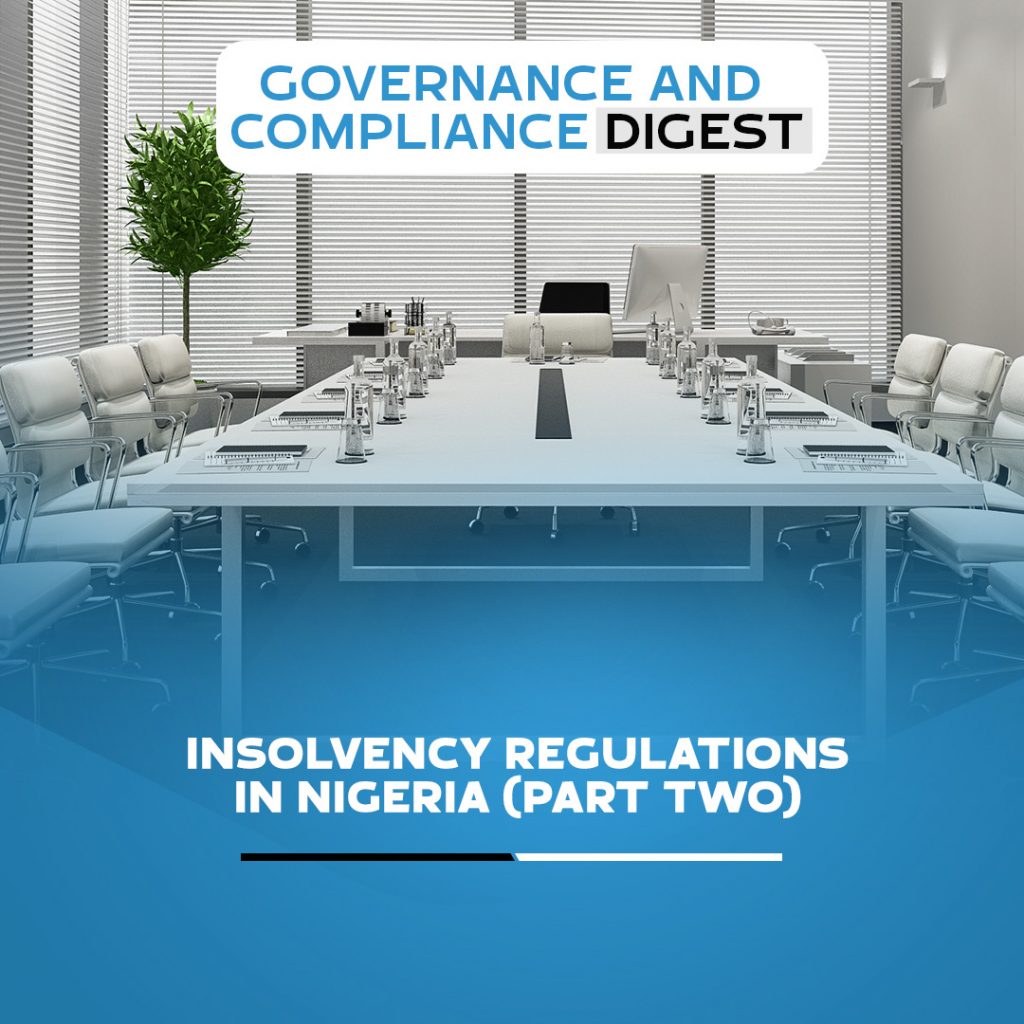Welcome to our Governance and Compliance Digest Newsletter. In the previous edition, we started a discussion on “Insolvency Regulations in Nigeria”. We will conclude the discussions in this edition of the Newsletter.
The fourth part of the Insolvency Regulations is described as Proxies and Corporate Representation. A Proxy is a document made by a creditor or member which directs or authorizes another person (“the Proxy Holder”) to act as the representative of the creditor or member at a meeting or meetings by speaking, voting, abstaining, or proposing a solution.
A Proxy may either be specific to a meeting or continuous for the insolvency proceedings. A Proxy can be described as blank when it complies with the requirement of the Insolvency Regulation. The blank proxy contains who the Proxy Holder is and if the Proxy is specific to a meeting or throughout the entire proceedings.
The fifth part is on the Creditor’s Committee. The main function of the Committee is to assist the Administrator in discharging the Administrator’s functions and act in relation to the administration of the Insolvent Company. In addition, to devise or revise a reorganization plan or decide whether the company should be liquidated.
The Committee shall have at least three members, but not be more than five. A Committee member can resign, terminate his/her membership and can be removed as provided in the Regulations. The Chair at the meeting of the Committee can be the Administrator or an Appointed person.
A Creditor can only be eligible to be a member of the Committee if:
- The Creditor has proved for a debt
- The debt is not fully secured (no collateral backing)
- The proof isn’t disallowed for voting purposes
Part six of the Regulation outlines how reporting should be executed and the remuneration of Administrators. The Administrator is expected to submit a progress report containing the following to the Commission:
- Identification details for the proceedings
- Identification and contact details for the Administrator
- The date of appointment of the Administrator and any changes in the Administrator in accordance with the regulations
- Details of progress during the period of the report, including a summary account of receipt and payments during the period of the report
- The information relating to remuneration and expenses required by the regulations
- The information relating to distributions if applicable
- Details of what remains to be done
- Any other information of relevance to the Creditors
Administrators are entitled to receive remuneration for services provided to the Insolvent Company. The basis of the remuneration shall be fixed:
- As a percentage of the value of the property which the Administrator has to deal
- By referencing to the time properly given by the Administrator and the Administrator staff in attending to matters arising in the administration.
- As a specific amount.
Determination of the basis of remuneration is to be done by the Committee and when they fail to do so, the decision can be taken by the Creditor.
Parts seven through twelve of the Regulations details the notice that must be given to the Commission before the following actions are taken:
- Netting events (netting is a payment mechanism under which the amount owed between two contracting parties are consolidated into a single smaller balance from one party to another)
- Appointments of receivers/managers
- Compulsory winding up
- Creditor’s voluntary winding up
- Arrangement and compromise
- Dissolution of incorporated trustees.
The final part of the Regulations details how the power of a Nominee or Supervisor should be agreed upon by the Creditor, the Insolvent Company Administrator, and the Directors of the Insolvent Company.
The Schedules contained in the Regulations describes the format by which Insolvency processes are to be documented by the Administrator and the requirements for undertaking Insolvency Proceedings.
The Schedule which is divided into three are:
The first Schedule describes the standard content of the Insolvency Practitioner Proposal. The Proposal should contain the detail of all the assets and liabilities of the Insolvent Company, the details, fees, and the duties of the Insolvency Practitioner which is to be submitted to the Commission.
The second Schedule states the guidelines for convening meetings between the committee such as persons to whom notice should be given, time place of the meeting, and notice of electronic facility for the meeting. In case of meetings of Creditors, a notice is to be given if one of the Creditors is to be represented by Proxy or by an Attorney.
The last Schedule is a form used by the Creditor in proving debts or claims titled “Federal Republic of Nigeria Companies and Allied Matters Act no 3 of 2020 Incorporated Trustees Under Part ‘F’ of the Act”
In conclusion, the Insolvency Regulation sets out the timeline and requirements needed to undertake Insolvency processes which are in line with contemporary business and global Insolvency practices.
Amongst others, the Regulation provides a legal framework for asset recovery or realization; an avenue where Creditors can contribute to the resolution of the financial problems that a business is experiencing as well as helping businesses to effectively manage deterioration or negative impact of the value of their assets.
Reference(s)
- “Insolvency Regulations 2022”. Corporate Affairs Commission, Nigeria, accessed 15th August 2022.
- “Federal Government Approves Insolvency Regulations for Companies”. KPMG Nigeria, accessed 16th August 2022.
- “Orderly & Effective Insolvency Procedures”. International Monetary Fund, accessed 19th August 2022.
For further discussion and assistance with filing any of your organization’s compliance returns to the Corporate Affairs Commission, as well as providing you with Board Evaluation and Nominee services, please contact us at contact@firstfiduciary.ng or any of the team member below:
Mercy Edukugho-Aminah
mercy.aminah@firstfiduciary.ng
+234 803 726 5961
Femi Goyea
femi.goyea@firstfiduciary.ng
+234 706 765 5214
